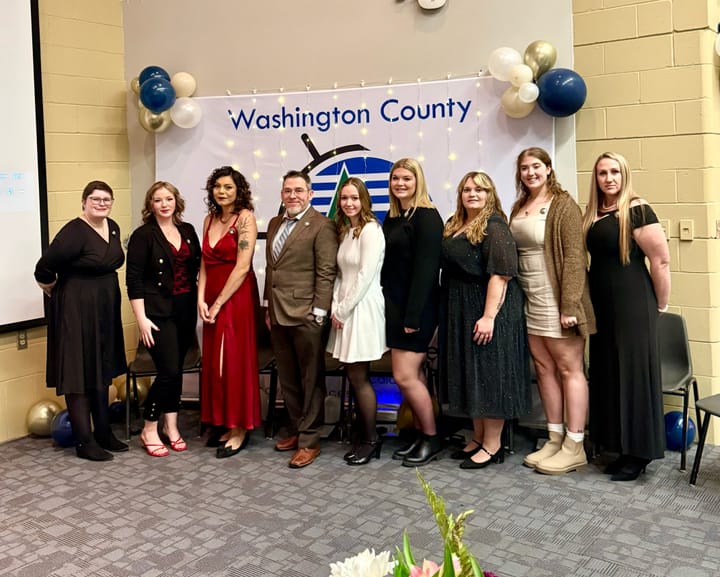Scallop fishery limited entry bill submitted
Scallop fishermen like Jeff Sullivan could still have their fishing boats but be unable to make any money with them if legislation proposed by the Maine Department of Marine Resources (DMR) is enacted.
Scallop fishermen like Jeff Sullivan could still have their fishing boats but be unable to make any money with them if legislation proposed by the Maine Department of Marine Resources (DMR) is enacted. The bill, which is taking fishermen by surprise, would establish limited entry for the scallop fishery in the state.
Sullivan, who invested "a substantial amount" in buying a boat this year, purchased a scallop fishing license this summer, but the bill proposal would set April 15, 2007, as the cut-off date by which one needed a license in order to qualify for one in 2009. The Eastport fisherman, who says he has "quite a bit tied up into it," says if the bill is approved as written that he is "pretty much done," since he can't fish for sea urchins or lobsters, with both fisheries having restrictions on the issuance of any new licenses.
The Maine Scallop Advisory Council has discussed limited entry for the fishery in the past and at its September 6 meeting voted 6-1, with one abstention, in favor of setting a control date of September 1, 2007, for entry into the fishery. The bill brought forward by the DMR, though, set the control date back to April 15, 2007. Sullivan notes that the DMR may fear that, if the control date is after the legislation is enacted, many people who don't have a scallop license might buy one. However, he notes that they also might have to invest in a boat and gear to fish for scallops.
Togue Brawn, resource management coordinator for the DMR, says the department is concerned about "excess capacity" in the fishery, with too many license holders for the resource. Landings have dropped from over 4.5 million pounds in 1991 to about 100,000 pounds today, although reporting is voluntary and the amount is probably higher. However, there are approximately 600 to 700 fishermen with scallop diving or dragging licenses. The DMR is concerned that if the scallop stocks come back, or if lobster landings plummet and more boats fish for scallops, the resource could quickly become overharvested. Limited entry is one of the tools, along with catch limits, minimum size restrictions and closures, to prevent overharvesting, Brawn notes. The bill would require that, in order to qualify for a 2009 scallop drag or dive license, a fisherman must have held one in 2006 or on April 15, 2007. It also would require that the license holder be on the vessel while it is fishing.
Will Hopkins, director of the Cobscook Bay Resource Center, agrees that there is a need for the development of significant scallop management measures in the state. He understands that the proposal is an effort "to get the conversation started" about scallop management, with other measures, including rotating closures, being considered by the DMR for introduction in the legislature in 2009. However, he believes that there is a tendency on the part of the state to take a "one size fits all" approach that often hurts Cobscook Bay fishermen. "Blanket measures that may make sense where there are no scallops may not make sense here," he notes.
Cobscook Bay is home to the last good scallop grounds in the state, Hopkins says, because the local fishermen pushed to protect it through a daily catch limit and meat count, along with other regulations for the bay. "Local scallopers have paid quite a price" in protecting the bay from being overharvested, he points out. That investment is just beginning to pay off, with a good scallop resource. He says it's understandable that fishermen who temporarily opted out of the fishery until it recovered would be upset over a limited entry measure that would keep them out the fishery.
Julie Keene, a fisherman from Trescott, agrees with Hopkins, noting that some fishermen who used to fish for scallops stopped buying a license "because the scallops just weren't there. And now that they are, now that we have waited and suffered out this self imposed conservation, they want to take away our right to fish."
She comments, "If there are no scallops in the rest of the state it is because the DMR has once again mismanaged the fisheries. All they need to do is take one look at the conservation work we did here in Cobscook and the law we requested so that we could have a fishery not get rich but have a fishery, a sustainable fishery. And now that we have one bam! they want to knock us down again."
"It is obvious that catch limits work," Keene adds. "If there had been a catch limit years ago on urchins we would probably still have a viable fishery. The state has a history of mismanaging the fisheries and a history of shutting off licenses to people when they have failed to manage the resources. I don't know about the rest of the state, but here on the bay they have no right to impose a moratorium on scallop licenses."
Hopkins observes that one of the shortcomings of the limited entry management tool is that it may keep out people who have traditionally switched from one fishery to another with the change in the seasons. Those people probably won't be able to make a living if they are confined to one fishery, he notes.
A hearing on the DMR bill by the legislature's Marine Resources Committee is expected to be held in January or February

